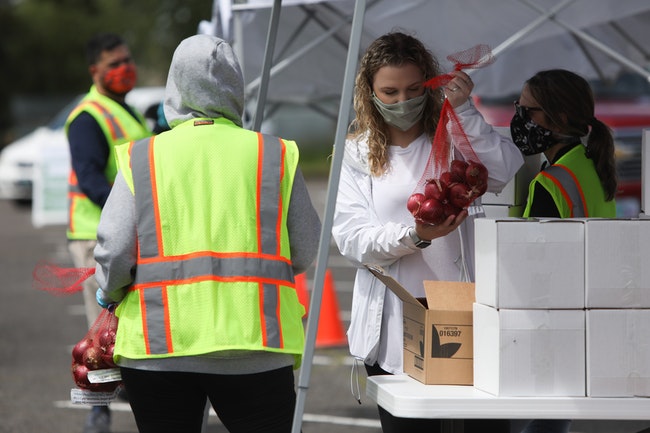
Jordan Hagedorn, a communications coordinator with the school district, grabs a bag of onions to be given away during a Farm to Families food box program distribution on Friday, May 22 at Washington Elementary School. (Amanda Loman/Salem Reporter)
Fresh broccoli, baby carrots and lettuce that would once have been destined for restaurants is now being distributed in boxes across Salem as part of a federal effort to help farmers and food distributors weather the COVID-19 pandemic.
But even with thousands of boxes shipped to Salem this week, the schools, nonprofit organizations and food banks passing out produce say they’re giving away food as fast as they can get it, a reflection of how need has surged with tens of thousands of Oregonians out of work.
“It is amazing product,” said Rick Gaupo, CEO of Marion Polk Food Share. They received three trucks full of produce this week – about 4,500 boxes – and are working to increase that to five next week.
In Oregon, the food comes from Portland-based Pacific Coast Fruit Co. It’s under a $25 million contract with the U.S. Department of Agriculture for the Farmers to Families program, part of the federal COVID-19 relief bill to buy and distribute food that would have gone to restaurants and schools.
PHOTOS: Food flows to needy Salem families as pandemic impacts persist
Through at least the end of June, Pacific Coast employees will pack 135,000 boxes weekly, shipping them across Oregon and Washington to food banks and other nonprofit organizations to give away.
Company president Tom Brugato said Pacific Coast supplies restaurants, schools and other large customers, many of whom closed or drastically reduced business after Gov. Kate Brown ordered restaurants to close for dine-in business on March 16.
“Pretty much about half of our business went away overnight,” Brugato said.
By the end of March, the company had furloughed 80 of its 400 workers at Portland and Seattle plants, with pay cuts for most of the rest.
Brugato said with the federal contract, Pacific Coast Fruit brought most of those employees back to work and are buying produce, milk and meat from farmers in California, Washington and Idaho, allowing them to keep their people on the job.
He’s hopeful the program will be continued and said they’ll order more from Oregon farms as the summer goes on.
“We’ll be able to really help a lot of growers,” he said.
They’ve had no trouble finding organizations to take the boxes, he said.
Gaupo said Farmers to Families got rolling at “lightning speed” for a federal program. Marion Polk Food Share received word of the contract May 14 and had food in hand four days later.
They’ll hand out boxes weekly at locations across the region, including several Salem-Keizer schools and Chemeketa Community College.
Demand for food has been growing since the pandemic began, Gaupo said. In April, Marion Polk Food Share received and distributed a million pounds of food locally, an organization record. Traffic at local food banks has continued to grow in May, he said.
At local elementary schools, teachers have added the produce boxes to weekly distributions of dried food.
At Washington Elementary School in north Salem, teachers passed out all 280 boxes of produce in the first 45 minutes of a scheduled two-hour giveaway on Friday, May 22.
Lillian Govus, district director of community relations, said they’ve easily run out at other schools as well. Some parents who had come to the schools to pick up regular boxes of canned foods didn’t know produce was added.
“There was a mom who was just in tears that it was there,” Govus said.
Catholic Community Services in Salem received a few hundred boxes Friday through the Archdiocese of Portland to distribute through community health workers. A planned afternoon giveaway to the public didn’t go on as planned because their shipment was smaller than expected, though dozens of people showed up seeking a box.
CEO Josh Graves said the current climate where food supply chains have been disrupted is stressful for many of his clients, who associate empty grocery store shelves with childhood poverty or experiences as refugees.
“Seeing empty shelves is really scary because sometimes it brings up memories of empty shelves at home,” he said.
Contact reporter Rachel Alexander: [email protected] or 503-575-1241.
SUPPORT SALEM REPORTER’S JOURNALISM – A monthly subscription starts at $5. Go HERE. Or contribute to keep our reporters and photographers on duty. Go HERE. Checks can be sent: Salem Reporter, 2925 River Rd S #280 Salem OR 97302. Your support matters.









